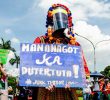
Members of the LGBT community carry a giant rainbow flag as they march against discrimination during the first Pride March in Davao City on June 1, 2016. (Ace R. Morandante/davaotoday.com file photo)
DAVAO CITY, Philippines – While the Philippines in general remains to be a relatively safe place for the LGBTIQ or lesbian, gay, bisexual, transgender, intersex and queer community compared to other Southeast Asian countries, the country still lacks national policies that shall protect their rights, advocates here said.
In an interview during the forum held at Cinematheque here Monday, July 31, humanitarian aid worker and organizer of #BuildingBridges2017, Rhadeem Camlian Morados, a Muslim gay guy said people in the Philippines, especially in Mindanao which has diverse culture, need to know more about SOGIE to open opportunities for discussions and as well as to contribute for the improvement of the LGBTIQ community. SOGIE stands for Sexual Orientation Gender Identity or Expression Equality.
“This is to educate the communities about the spectrum of LGBTIQ and at the same time empower and activate the sense of advocacy and activism of the LGBT communities and its allies or supporters,” Morados said.
During the forum one of the challenges that was highlighted is culture since many tribes do not welcome the idea of having LGBTIQ in their communities and even considers an LGBTIQ individual as an outcast.
Morados said this is considered one of the hardest to address and needs a careful deliberation in reaching out to them.
“We really need to know more about SOGIE. Mindanao needs that. I’ve been doing a lot of humanitarian aid working here in Mindanao and I felt there’s a lot of people who really need this kind of talk and education and I felt that it would open up to a more progressive opportunity and progressive improvement towards LGBT,” he said.
“If we have the voice we need to find a means to communicate that and to spread that out evenly to everyone. We need to be heard if we have something to say for the better good,” he added.
Jan Gabriel Castañeda of Association of Southeast Asian Nation (ASEAN) Sexual Orientation Gender Identity or Expression Equality Caucus (SOGIESC), a regional network of human rights defenders, said although the national and several local government units already took several steps to uphold the rights of the homosexuals, bisexuals and transgender, the country remains to be a “mixed bag” when it comes to LGBTIQ rights.
According to the Universal Periodic Review 2017 by the joint submission of the Civil Society Organisations (CSOs) on LGBTIQ persons in the Philippines, “there are no coordinated and comprehensive mechanisms that monitor the instances of discrimination and violence” thus, violence against these persons is still prevalent. Victims suffer violence including physical, verbal, emotional abuse from strangers and even from family members.
Castañeda stressed that what they want to achieve with the proposed SOGIE Act is for the LGBTIQ people to have the right to live.
“I want LGBT people to live. That is really like the most basic thing,” Castañeda said. “And what do we mean by being alive? It’s being able to do the things that we feel will give us joy and passion- in art, music, etc., having a good job, taking care of a family, being able to walk in the streets without being harassed,” he added.
Castañeda said the approval of the proposed House Bill 4982, also known as the SOGIE Equality Act will help address the issues of discrimination and violence among the LGBTIQ community.
Castañeda pointed that for the bill to reach the Senate plenary after 17 years is a huge improvement for the community.
“The fact that after 17 long years, the anti-discrimination bill in the Senate and Congress is moving already and it’s going through the readings and all, that’s so great,” Castañeda said.
The SOGIE Equality Act seeks to provide equal opportunities for the LGBTIQ people and protect their rights especially on instances of abuses.
Castañeda said with the SOGIE Equality Act being discussed already in the Congress, and with initiatives of various groups and sectors in reaching out with the public, he’s enthusiastic that the community will have a better place in the country.
Castañeda also urged the LGBTIQ people and organizations to voice out their sentiments for them to know more about the current situation.
“I hope that more LGBT people or organizations will voice their concern. We need to hear from them we need to know what is happening in these areas and we need to show everyone that we need to work together,” Castañeda said.
“Karapatang Pantao (human rights) was never given, people have to fight for it, women have to fight for the chance to vote. We had to fight for minimum wage. This is not different, not different at all,” Castañeda said. (davaotoday.com)










